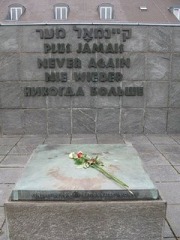
In the summer of 2007 I traveled around Europe for a few weeks. One of the places I visited was Dachau, a town in Germany where a Nazi Concentration Camp was located. When we left Germany on a train to France a German (male, I am guessing about 35-40 years old) asked us why so many Americans came to visit Concentration Camps- he didn’t seem to understand why we thought it was so important to “our” history.
When a tragic event happens and near to ten million people die it is hard to believe the event does not have an effect on nearly everyone in the world. We were supposed to learn a lesson from the Holocaust- “Never Again” was the main point. So why do similar things continue to happen?
Journal Question-
Why did people let the Holocaust Happen? Does this have any importance to you?
The Assignment
visit http://www.ushmm.org/conscience/history/ a section of the U.S. Holocaust Museum.
You are to research either;
the Genocide in Rwanda,
the Genocide in Darfur
or the Genocide in Srebrenica.
You are to compare one of these Genocides to the original Holocaust (where/who)
Try to determine why those events were allowed to happen despite our pledge of “Never Again”.
Your assignment is to write a letter to the “United Nations”. As a historian you are going to explain the research you have done about Holocausts (genocide). Tell them why it is important to you for them to make sure it never “happens again”.
This is a one page formal letter- remember-
1. compare/explain the genocides you studied
2. Explain the importance of getting involved.
A Reflection back on World History One's project on the American Bill of Rights and the British Bill of Rights.
How is the "Universal Declaration of Human Rights" similar to the American Bill of Rights and British Bill of Rights?
http://mrfwh1.weebly.com/constitutionalism.html
Alternative Assignment (1 page each)
1. Describe the Holocaust.
2. What were the Nuremberg Trials and what were the results of these trials?
